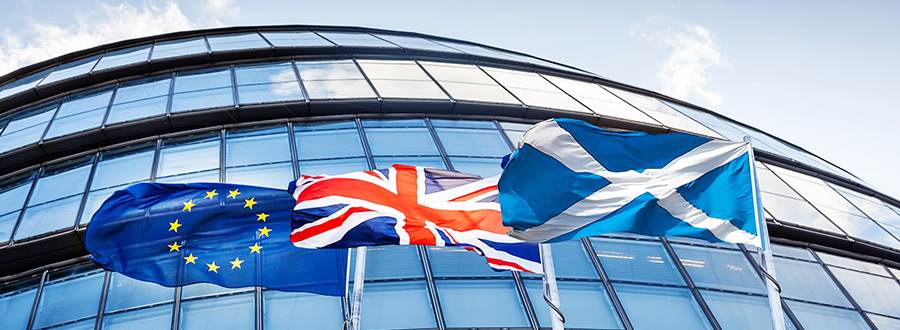With Scottish voters rejecting Brexit very strongly in the 2016 referendum, the increasingly fractious debate about how the UK leaves has put the question of Scottish independence back on the table. Scottish voters rejected leaving the UK in 2014 in a supposedly once-in-a-generation vote. But Scottish Nationalist Party leader Nicola Sturgeon is committed to holding another referendum by 2021 if Scotland leaves the EU as part of Brexit.
What if Scotland votes “Yes” in the next referendum on independence? Would this see Scotland adopt the euro rather than the pound as its currency? If so, the complications of untangling a relationship that has endured for more than 300 years might make Brexit look like a picnic. There will be many challenges – including problems for businesses and individuals based in Scotland who receive payments from companies based elsewhere in the UK, which would be paid in Sterling.
Indeed, anyone in this position would suddenly have to worry about exchange rates. That would be good news for currency dealers, but probably no-one else. Scotland-based suppliers, contractors, business partners and service providers to companies elsewhere in the UK would all face a significant challenge – so too would those responsible for paying them.
One basic question is whether today’s payment practices would still be possible in the event that Scotland changed its currency as a result of gaining independence. Most payments in the UK are currently made through the BACS system, but that might not be possible once such payments count as cross-border transactions when they’re going to Scottish recipients.
Scottish-based businesses and individuals should also worry about how far their income would stretch were they to switch to the euro. When the single currency was launched in 2002, consumers across Europe complained that prices rose appreciably, even if that simply reflected shopkeepers rounding up sales prices when converting from the old currencies to the new one. Some research rejects this as purely a perception rather than a reality, but consumers certainly felt worse off.
It is, of course, possible for UK companies to make payments to recipients in other countries – they do it all the time. But this requires more complex planning and bureaucracy than simply using domestic payments systems. The system varies according to the country in question and its local rules and regulations – the best approach to making payments to recipients in one territory may be completely different to what works well elsewhere.
Equally, some payment recipients will have to make choices they have never before had to confront. It may make sense for some Scotland-based individuals and organisations to have payments made to a UK bank account, particularly if they still have links with this country. Or they might choose to set up a sterling-denominated bank account in Scotland, if available. Alternatively, they may decide to use the international payments system to receive payments in local currency; this may require them to take their chances with exchange rate movements.
It’s difficult to know exactly how many people would be affected by these issues, but the numbers are likely to be significant. Analysis done ahead of the last independence vote in 2014 concluded there were almost 500,000 English, Welsh and Northern Irish people living in Scotland (and more than 700,000 Scots living in other parts of the UK). That gives an idea of the scale of the potential problem. Scotland-based suppliers and contractors routinely do business with firms in England, Wales and Northern Ireland – and vice versa. Even employees living on a different side of the border to their employers could be affected.
None of which is to suggest the problems are insurmountable. But while most issues can be solved, cross-border transactions are more complicated to manage than domestic sterling payments, both for the organisations making them and their recipients. Businesses may need specialist help to ensure they can go on making payments to recipients in Scotland. Those recipients will have some decisions to make.
In the context of the break-up of the UK, these discussions may feel like small details in a much bigger picture. But for those relying on these payments going ahead seamlessly, they are vital. It’s another reminder that the complexities of challenges such as Brexit and Scottish independence will be felt far and wide.
Andy Brown is Director of Payment Services at EQPay, part of Equiniti.

